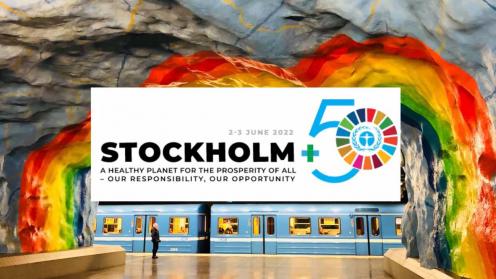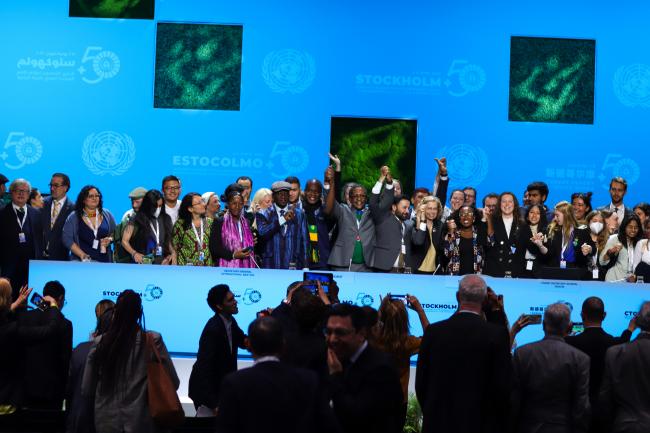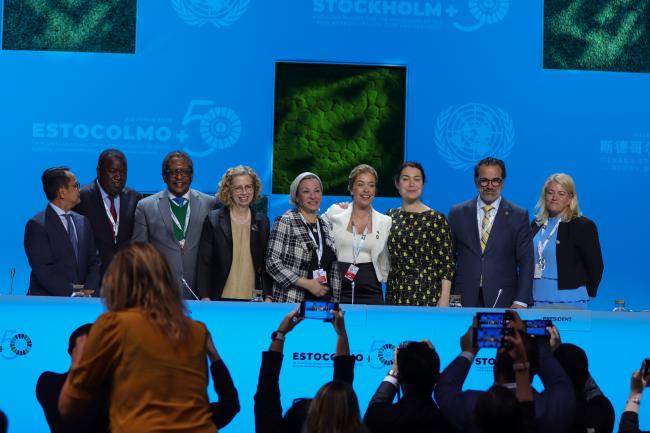On the second and final day of Stockholm+50, Annika Strandhäll, Sweden, and Keriako Tobiko, Kenya, deputizing for the meeting presidents, presented ten key recommendations from the meeting. The recommendations emerged from Member States and Stakeholders through the Plenary and the three Leadership Dialogues.
Stockholm+50 was carefully designed as a distinctive moment for the increasingly diverse community of participants who now populate the multilateral environmental processes launched by the 1972 Stockholm Conference. By investing in a highly participatory and informal preparatory process around the world, including a Youth Task Force, and panel-style deliberations, the organizers managed to set a new trajectory, shifting from the 1972 era’s focus on institutions and treaties to a radical system-wide focus on the wellbeing economy and all that that entails for a polycentric approach to future delivery.
Throughout the day, government representatives continued to meet in Plenary. Topics addressed included: the Russia-Ukraine conflict; the triple planetary crisis of climate change, biodiversity loss, and pollution; the need for multilateral cooperation, including financial assistance and technology transfer, for those hardest hit by the crises; and legal rights. After the government representatives had spoken, presentations were made by numerous intergovernmental organizations and Major Group (stakeholder) representatives.
The meeting was brought to a close Friday evening at 7:13 pm after a round of Plenary meetings, and free-flowing Leadership Dialogues on achieving a sustainable and inclusive recovery from the pandemic, and accelerating the implementation of the environmental dimension of sustainable development. A series of side events and a multi-stakeholder action hub also concluded.
The ten recommendations presented on behalf of the Co-Presidents, are:
- Place human well-being at the centre of a healthy planet and prosperity for all, through recognizing that a healthy planet is a prerequisite for peace, cohesion and prosperous societies;
- Recognize and implement the right to a clean, healthy and sustainable environment, through fulfilling the vision articulated in principle 1 of the 1972 Stockholm Declaration;
- Adopt system wide change in the way our current economic system works to contribute to a healthy planet;
- Strengthen national implementation of existing commitments for a healthy planet;
- Align public and private financial flows with environmental climate and sustainable development commitments;
- Accelerate system-wide transformations of high impact sectors, such as food, energy, water, buildings, and construction, manufacturing and mobility;
- Rebuild relationships of trust for strengthened cooperation and solidarity;
- Reinforce and reinvigorate the multilateral system;
- Recognize intergenerational responsibility as a cornerstone of sound policy-making; and
- Take forward the Stockholm+50 outcomes.
All ENB photos are free to use with attribution. For Stockholm+50 on 3 June 2022, please use: Photo by IISD/ENB | Kiara Worth or Matthew TenBruggencate per photograph descriptions.
To receive free coverage of global environmental events delivered to your inbox, subscribe to the ENB Update newsletter.
Closing Plenary

Keriako Tobiko, Cabinet Secretary for the Ministry of Environment and Forestry, Kenya and Annika Strandhäll, Minister for Climate and the Environment, Sweden, gavel Stockholm+50 to a close

Gustavo Manrique Miranda, Minister of Environment, Water, and Ecological Transition, Ecuador, presents the report of Leadership Dialogue 1
Leadership Dialogue 2: Achieving a sustainable and inclusive recovery from the COVID-19 pandemic

Ambassador Tri Tharyat, Indonesia, and Steffi Lemke, Federal Ministry for the Environment, Nature Conservation, Nuclear Safety and Consumer Protection, Germany, co-chair the Leadership Dialogue.

The first panel of Leadership Dialogue 2: Achieving a sustainable and inclusive recovery from the COVID-19 pandemic

Josefa Leonel Correia Sacko, Commissioner for Agriculture, Rural Development, Blue Economy and Sustainable Development. of the African Union Commission

David Boyd, associate professor of law, policy, and sustainability at the University of British Columbia

































































